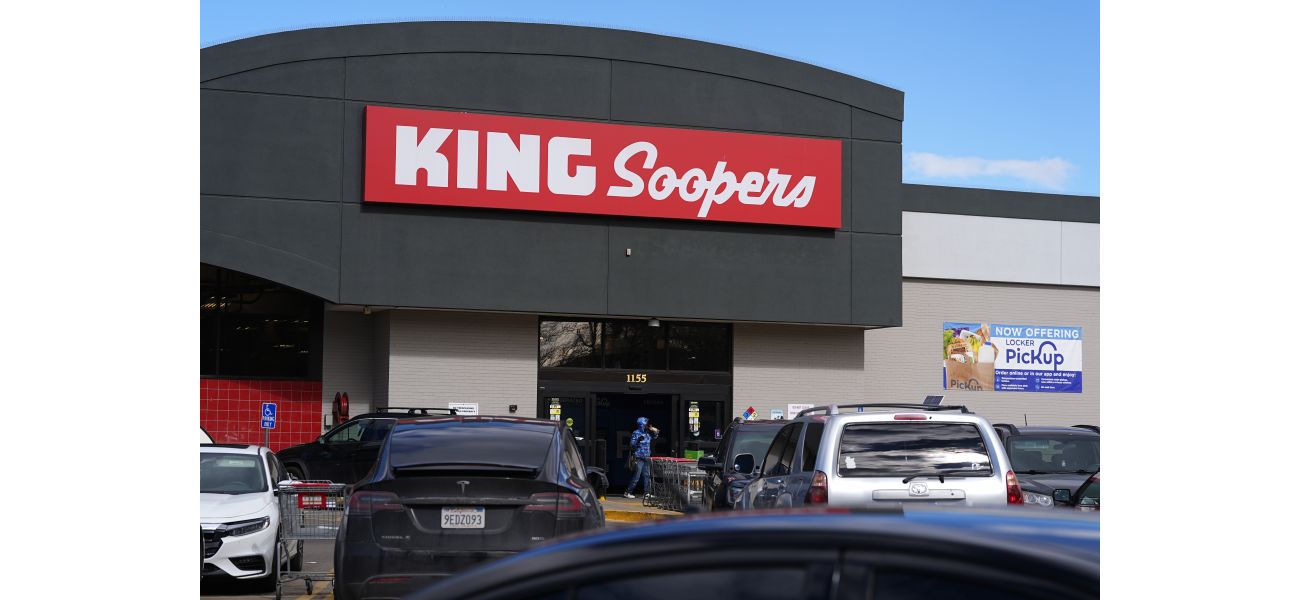The trial in Colorado over the Kroger-Albertsons merger has concluded, and a judge will now make a decision.
Verdicts awaited for Kroger-Albertsons merger in three cases.
October 25th 2024.

The trial over the proposed $24.6 billion merger between Kroger and Albertsons came to a close on Thursday, with both sides attacking each other's expert witnesses and accusing the other of having ulterior motives that would ultimately hurt Colorado shoppers and workers. This marked the end of a lengthy trial that began on October 1st, making it the third attempt to block the merger on the grounds that it would lead to increased prices, reduced competition, and negative impacts on customers, employees, and local suppliers. The Federal Trade Commission and the attorneys general for Colorado and Washington State filed lawsuits, citing violations of antitrust laws at both the federal and state levels.
Judge Andrew J. Luxen of the Denver District Court will be the one to issue a ruling in this case. However, as of Thursday, there was no specific timeline for when that decision would be made. The Attorney General of Colorado, Phil Weiser, had filed the initial lawsuit in February after conducting 19 town halls throughout the state to gather input from the public. According to Weiser, the overwhelming majority of people were against the merger.
On the other hand, Matt Wolf, the attorney representing Kroger, claimed that the state was simply trying to prevent his client from bringing lower prices to Colorado shoppers and higher wages to workers. As part of their merger proposal, Kroger had promised to invest $1 billion annually in increasing employee compensation and benefits, as well as another $1 billion in lowering prices for customers. Wolf argued, "The antitrust laws were written to encourage, not obstruct, pro-consumer deals like the one before the court. While Walmart, Costco, and Amazon may be pleased with the state's efforts, grocery shoppers will end up paying more and getting less if the state has its way."
During the trial, both Kroger CEO Rodney McMullen and Albertsons CEO Vivek Sankaran testified that the merger was necessary for the two companies to effectively compete against Walmart, the top-selling grocer in the nation, as well as other growing chains. Sankaran warned that without the merger, Albertsons may have to lay off employees and exit certain markets to remain financially viable. However, the state's attorneys argued against this, stating that the proposed merger, which would be the largest in U.S. history, would result in store closures, job losses, and higher prices. In Colorado specifically, Kroger and Albertsons together account for at least 50% of all grocery sales, according to the Attorney General's office.
As a solution to these concerns, the two companies proposed to sell 579 of their stores to C&S Wholesale Grocers, a grocery distributor. However, the state's attorney, Arthur Biller, argued that this would not be effective as C&S lacks the resources and experience to compete with Kroger after the merger. He also pointed out that C&S has a history of selling off stores it has acquired, as they see it as beneficial for their distribution business. Biller stated, "This not only makes C&S a smaller competitor than Albertsons, but a worse one."
In Colorado, the proposed divestiture would involve the sale of 91 Albertsons stores, a dairy plant, and a distribution center to C&S. Out of these, two are Albertsons stores, while the rest are under the Safeway banner. As part of the $2.9 billion deal with C&S, the Albertsons stores will continue to operate under the Safeway banner in Colorado and the distribution company will have the rights to sell some of Albertsons' private-label brands. Despite a state witness testifying otherwise, the defense attorneys argued that C&S has the necessary resources and personnel to take over these stores.
During the closing arguments, attorney Wolf rejected the findings of a state witness, Roger Davidson, an industry consultant, and accused him of lying about his academic credentials and having a conflict of interest due to his business connections. He also criticized the analysis of another state witness, Nitin Dua, who downplayed the competition posed by national chains like Costco and Amazon to Kroger and Albertsons.
Biller also criticized the modeling done by a defense expert witness on competitors, stating that it was unreliable and produced "absurd results." One of the main issues in this lawsuit is the $1 million civil penalty that the Attorney General of Colorado is seeking from both companies for allegedly having no-poach and non-solicitation agreements during a 2022 strike against King Soopers. According to Weiser, his office found emails showing that Albertsons had agreed not to hire any King Soopers employees or solicit their pharmacy customers during the strike. However, both companies have denied the existence of such an agreement.
The United Food and Commercial Workers Local 7, a union representing grocery workers in Colorado and Wyoming, is part of a coalition of unions fighting against the merger, which was first announced in 2022. While Albertsons and Kroger executives have assured that no stores will be closed and no frontline workers will lose their jobs if the merger is approved, union members point to the consequences of Albertsons' purchase of Safeway in 2015. Following the sale, Haggen Food and Pharmacy, a small supermarket chain, acquired some stores but eventually filed for bankruptcy, resulting in over 100 stores closing and thousands of workers losing their jobs.
A decision is still pending in a trial in Oregon where the Federal Trade Commission has also sued to block the merger until they can resolve their administrative complaint against Kroger and Albertsons. The attorneys general of several states have joined this lawsuit as well. The judge presiding over the case in Washington state is expected to make a ruling during a hearing on November 15th. To stay updated on business news, sign up for our Economy Now newsletter.
Judge Andrew J. Luxen of the Denver District Court will be the one to issue a ruling in this case. However, as of Thursday, there was no specific timeline for when that decision would be made. The Attorney General of Colorado, Phil Weiser, had filed the initial lawsuit in February after conducting 19 town halls throughout the state to gather input from the public. According to Weiser, the overwhelming majority of people were against the merger.
On the other hand, Matt Wolf, the attorney representing Kroger, claimed that the state was simply trying to prevent his client from bringing lower prices to Colorado shoppers and higher wages to workers. As part of their merger proposal, Kroger had promised to invest $1 billion annually in increasing employee compensation and benefits, as well as another $1 billion in lowering prices for customers. Wolf argued, "The antitrust laws were written to encourage, not obstruct, pro-consumer deals like the one before the court. While Walmart, Costco, and Amazon may be pleased with the state's efforts, grocery shoppers will end up paying more and getting less if the state has its way."
During the trial, both Kroger CEO Rodney McMullen and Albertsons CEO Vivek Sankaran testified that the merger was necessary for the two companies to effectively compete against Walmart, the top-selling grocer in the nation, as well as other growing chains. Sankaran warned that without the merger, Albertsons may have to lay off employees and exit certain markets to remain financially viable. However, the state's attorneys argued against this, stating that the proposed merger, which would be the largest in U.S. history, would result in store closures, job losses, and higher prices. In Colorado specifically, Kroger and Albertsons together account for at least 50% of all grocery sales, according to the Attorney General's office.
As a solution to these concerns, the two companies proposed to sell 579 of their stores to C&S Wholesale Grocers, a grocery distributor. However, the state's attorney, Arthur Biller, argued that this would not be effective as C&S lacks the resources and experience to compete with Kroger after the merger. He also pointed out that C&S has a history of selling off stores it has acquired, as they see it as beneficial for their distribution business. Biller stated, "This not only makes C&S a smaller competitor than Albertsons, but a worse one."
In Colorado, the proposed divestiture would involve the sale of 91 Albertsons stores, a dairy plant, and a distribution center to C&S. Out of these, two are Albertsons stores, while the rest are under the Safeway banner. As part of the $2.9 billion deal with C&S, the Albertsons stores will continue to operate under the Safeway banner in Colorado and the distribution company will have the rights to sell some of Albertsons' private-label brands. Despite a state witness testifying otherwise, the defense attorneys argued that C&S has the necessary resources and personnel to take over these stores.
During the closing arguments, attorney Wolf rejected the findings of a state witness, Roger Davidson, an industry consultant, and accused him of lying about his academic credentials and having a conflict of interest due to his business connections. He also criticized the analysis of another state witness, Nitin Dua, who downplayed the competition posed by national chains like Costco and Amazon to Kroger and Albertsons.
Biller also criticized the modeling done by a defense expert witness on competitors, stating that it was unreliable and produced "absurd results." One of the main issues in this lawsuit is the $1 million civil penalty that the Attorney General of Colorado is seeking from both companies for allegedly having no-poach and non-solicitation agreements during a 2022 strike against King Soopers. According to Weiser, his office found emails showing that Albertsons had agreed not to hire any King Soopers employees or solicit their pharmacy customers during the strike. However, both companies have denied the existence of such an agreement.
The United Food and Commercial Workers Local 7, a union representing grocery workers in Colorado and Wyoming, is part of a coalition of unions fighting against the merger, which was first announced in 2022. While Albertsons and Kroger executives have assured that no stores will be closed and no frontline workers will lose their jobs if the merger is approved, union members point to the consequences of Albertsons' purchase of Safeway in 2015. Following the sale, Haggen Food and Pharmacy, a small supermarket chain, acquired some stores but eventually filed for bankruptcy, resulting in over 100 stores closing and thousands of workers losing their jobs.
A decision is still pending in a trial in Oregon where the Federal Trade Commission has also sued to block the merger until they can resolve their administrative complaint against Kroger and Albertsons. The attorneys general of several states have joined this lawsuit as well. The judge presiding over the case in Washington state is expected to make a ruling during a hearing on November 15th. To stay updated on business news, sign up for our Economy Now newsletter.
[This article has been trending online recently and has been generated with AI. Your feed is customized.]
[Generative AI is experimental.]
0
0
Submit Comment





